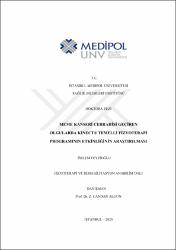| dc.contributor.advisor | Algun, Zeliha Candan | |
| dc.contributor.author | Feyzioğlu, Özlem | |
| dc.date.accessioned | 2021-08-25T11:06:43Z | |
| dc.date.available | 2021-08-25T11:06:43Z | |
| dc.date.issued | 2020 | en_US |
| dc.date.submitted | 2020-03-06 | |
| dc.identifier.citation | Feyzioğlu, Ö. (2020). Meme kanseri cerrahisi geçiren olgularda kinect® temelli fizyoterapi programının etkinliğinin araştırılması. (Yayınlanmamış doktora tezi). İstanbul Medipol Üniversitesi Sağlık Bilimleri Enstitüsü, İstanbul. | en_US |
| dc.identifier.uri | https://hdl.handle.net/20.500.12511/7980 | |
| dc.description.abstract | Meme kanseri cerrahisi sonrası erken dönemde üst ekstremitede ağrı, hareket kısıtlılığı ve kuvvet kaybı gibi çeşitli sorunlar görülmektedir. Çalışmamızın amacı meme kanseri cerrahisi sonrası erken dönemde sanal gerçeklik ortamında uygulanılan egzersizlerin ve standart fizyoterapi yaklaşımının ağrı, eklem hareket açıklığı (EHA), kas kuvveti, fonksiyonellik, yaşam kalitesi, yorgunluk ve kinezyofobi üzerine etkisini araştırmaktı. Tek taraflı meme cerrahisi geçiren, aksillar diseksiyon yapılan ve adjuvan tedavi alan 40 kadın tedaviye alındı ve randomize olarak 2 gruba ayrıldı. Kinect temelli rehabilitasyon grubu (KG) ve Standart Fizyoterapi Grup (SFG ). KG (n=20) Xbox Kinect® kullanılarak uygulanılan sanal rehabilitasyon, SFG (n=20) standart üst ekstremite fizyoterapi programı aldı. Seanslar haftada 2 gün / 6 hafta uygulandı. Hastaların ağrı şiddeti Visuel Analog Skala (VAS) ile, EHA digital gonyometre ile, üst ekstremite kas ve kavrama kuvveti dinamometre ile fonksiyonelliği Kol Omuz ve El Sorunları Anketi (DASH) ile hareket korkusu Tampa Kinezyofobi Skalası (TKS) ile, yorgunluğu Kanser Yorgunluk Skalası (CFS) ile, yaşam kalitesi EORTC-QOL-BR23 ile, tedavi öncesi ve sonrası değerlendirildi. Her iki grupta da tedaviden sonra ağrı, EHA, üst ekstremite kas ve kavrama kuvveti, fonksiyonellik, CFS, yaşam kalitesinin bazı alt parametrelerinde ve TKS skorlarında anlamlı değişiklikler saptandı (p <0.01). KG'de hareket korkusu SFG'den istatistiksel olarak daha fazla iyileşme gösterirken SFG'de fonksiyonellik daha fazla iyileşme gösterdi (p <0.05). Tedavi sonrası gruplar arasında DASH ve TKS skorları dışındaki sonuç ölçümlerinde fark oluşmadı (p> 0.05). Meme ameliyatı sonrası Kinect temelli fizyoterapi programı klinik parametrelerde standart fizyoterapi ile karşılaştırılabilecek anlamlı sonuçlar gösterdi. | en_US |
| dc.description.abstract | Various problems such as pain, limitation of motion and loss of strength are seen in upper extremity in the early period after breast cancer surgery. The aim of our study was to investigate the effects of standard physiotherapy approach and exercises applied in virtual reality environment in the early period after breast cancer surgery on pain, range of motion (ROM), muscle strength, functionality, quality of life, fatigue and kinesiophobia. Forty women who underwent unilateral breast surgery with axillary dissection and received adjuvant therapy were randomized into two treatment groups as Kinect-based rehabilitation group (KG) and Standard Physiotherapy group (SFG). KG, received virtual rehabilitation using Xbox Kinect® and SGF received standard upper extremity physiotherapy program 2 days / 6 weeks. Pain intensity was assessed with Visuel Analog Scale (VAS), ROM was determined using digital goniometer, upper extremity muscle and grip force was measured with a dynamometer. We used Disability of the Arm Shoulder and Hand (DASH) scale for determining the level of functionality, Tampa Kinesiophobia Scale (TKS) for determining the level of kinesiophobia, Cancer Fatigue Scale (CFS) determining the level of fatigue, European Organization for Research and Treatment of Cancer (EORTC-QOL-BR23) determining the level of quality of life before and after treatment. In both groups, significant changes were found in pain, ROM, upper extremity muscle and grip strength, functionality, CFS, some sub-parameters of quality of life and TKS scores after treatment (p <0.01). While the fear of movement in KG showed statistically more improvement than SFG, the level of functionality showed more improvement in SG (p <0.05). There were no difference between the groups after treatment except for DASH and TKS scores (p> 0.05). Kinect-based physiotherapy program after breast surgery showed significant results in clinical parameters that can be compared with standard physiotherapy. | en_US |
| dc.language.iso | tur | en_US |
| dc.publisher | İstanbul Medipol Üniversitesi Sağlık Bilimleri Enstitüsü | en_US |
| dc.rights | info:eu-repo/semantics/openAccess | en_US |
| dc.subject | Fizyoterapi | en_US |
| dc.subject | Meme Kanseri | en_US |
| dc.subject | Sanal Gerçeklik | en_US |
| dc.subject | Üst Ekstremite | en_US |
| dc.subject | Xbox Kinect | en_US |
| dc.subject | Physiotherapy | en_US |
| dc.subject | Breast Cancer | en_US |
| dc.subject | Virtual Reality | en_US |
| dc.subject | Upper Extremity | en_US |
| dc.subject | Xbox Kinect | en_US |
| dc.title | Meme kanseri cerrahisi geçiren olgularda kinect® temelli fizyoterapi programının etkinliğinin araştırılması | en_US |
| dc.title.alternative | Investigation of the effectiveness of kinect® basic physiotherapy program in patients with breast cancer surgery | en_US |
| dc.type | doctoralThesis | en_US |
| dc.department | İstanbul Medipol Üniversitesi, Sağlık Bilimleri Enstitüsü, Fizyoterapi ve Rehabilitasyon Ana Bilim Dalı | en_US |
| dc.relation.publicationcategory | Tez | en_US |


















